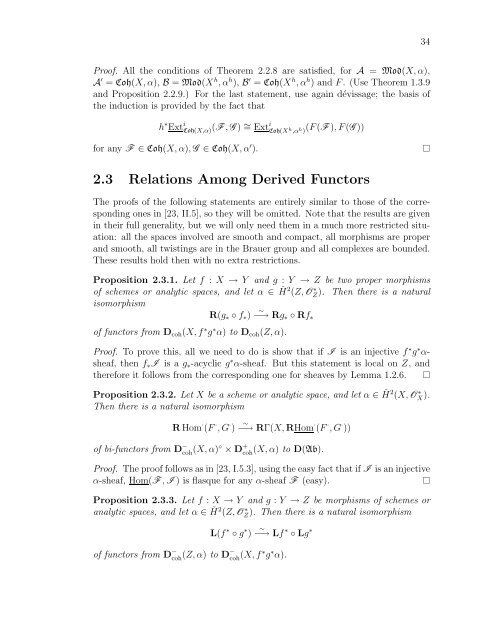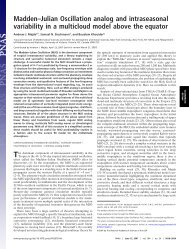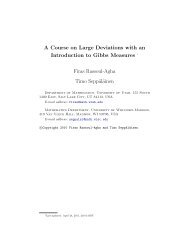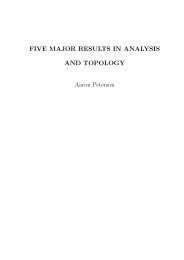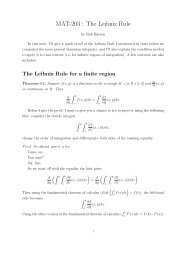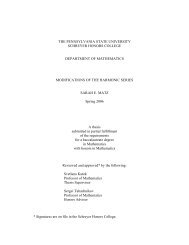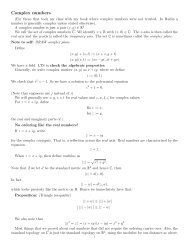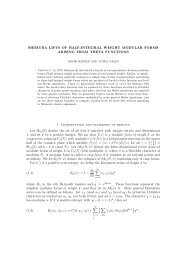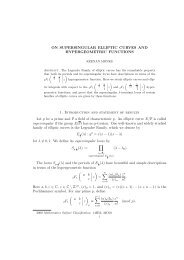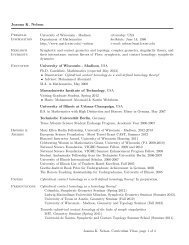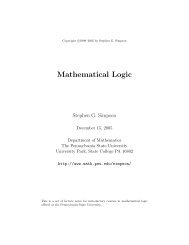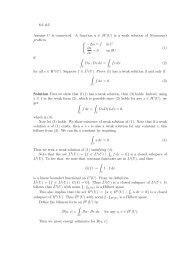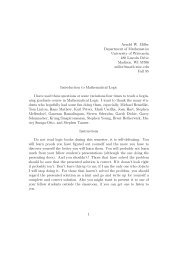derived categories of twisted sheaves on calabi-yau manifolds
derived categories of twisted sheaves on calabi-yau manifolds
derived categories of twisted sheaves on calabi-yau manifolds
Create successful ePaper yourself
Turn your PDF publications into a flip-book with our unique Google optimized e-Paper software.
Pro<str<strong>on</strong>g>of</str<strong>on</strong>g>. All the c<strong>on</strong>diti<strong>on</strong>s <str<strong>on</strong>g>of</str<strong>on</strong>g> Theorem 2.2.8 are satisfied, for A = Mod(X, α),<br />
A ′ = Coh(X, α), B = Mod(X h , α h ), B ′ = Coh(X h , α h ) and F . (Use Theorem 1.3.9<br />
and Propositi<strong>on</strong> 2.2.9.) For the last statement, use again dévissage; the basis <str<strong>on</strong>g>of</str<strong>on</strong>g><br />
the inducti<strong>on</strong> is provided by the fact that<br />
h ∗ Ext i<br />
Coh(X,α)(F , G ) ∼ = Ext i<br />
Coh(Xh ,αh ) (F (F ), F (G ))<br />
for any F ∈ Coh(X, α), G ∈ Coh(X, α ′ ).<br />
2.3 Relati<strong>on</strong>s Am<strong>on</strong>g Derived Functors<br />
The pro<str<strong>on</strong>g>of</str<strong>on</strong>g>s <str<strong>on</strong>g>of</str<strong>on</strong>g> the following statements are entirely similar to those <str<strong>on</strong>g>of</str<strong>on</strong>g> the corresp<strong>on</strong>ding<br />
<strong>on</strong>es in [23, II.5], so they will be omitted. Note that the results are given<br />
in their full generality, but we will <strong>on</strong>ly need them in a much more restricted situati<strong>on</strong>:<br />
all the spaces involved are smooth and compact, all morphisms are proper<br />
and smooth, all twistings are in the Brauer group and all complexes are bounded.<br />
These results hold then with no extra restricti<strong>on</strong>s.<br />
Propositi<strong>on</strong> 2.3.1. Let f : X → Y and g : Y → Z be two proper morphisms<br />
<str<strong>on</strong>g>of</str<strong>on</strong>g> schemes or analytic spaces, and let α ∈ ˇ H2 (Z, O∗ Z ). Then there is a natural<br />
isomorphism<br />
R(g∗ ◦ f∗) ∼<br />
−→ Rg∗ ◦ Rf∗<br />
<str<strong>on</strong>g>of</str<strong>on</strong>g> functors from Dcoh(X, f ∗ g ∗ α) to Dcoh(Z, α).<br />
Pro<str<strong>on</strong>g>of</str<strong>on</strong>g>. To prove this, all we need to do is show that if I is an injective f ∗ g ∗ αsheaf,<br />
then f∗I is a g∗-acyclic g ∗ α-sheaf. But this statement is local <strong>on</strong> Z, and<br />
therefore it follows from the corresp<strong>on</strong>ding <strong>on</strong>e for <str<strong>on</strong>g>sheaves</str<strong>on</strong>g> by Lemma 1.2.6.<br />
Propositi<strong>on</strong> 2.3.2. Let X be a scheme or analytic space, and let α ∈ ˇ H 2 (X, O ∗ X ).<br />
Then there is a natural isomorphism<br />
R Hom · (F · , G · ) ∼<br />
−→ RΓ(X, RHom · (F · , G · ))<br />
<str<strong>on</strong>g>of</str<strong>on</strong>g> bi-functors from D −<br />
coh (X, α)◦ × D +<br />
coh (X, α) to D(Ab).<br />
Pro<str<strong>on</strong>g>of</str<strong>on</strong>g>. The pro<str<strong>on</strong>g>of</str<strong>on</strong>g> follows as in [23, I.5.3], using the easy fact that if I is an injective<br />
α-sheaf, Hom(F , I ) is flasque for any α-sheaf F (easy).<br />
Propositi<strong>on</strong> 2.3.3. Let f : X → Y and g : Y → Z be morphisms <str<strong>on</strong>g>of</str<strong>on</strong>g> schemes or<br />
analytic spaces, and let α ∈ ˇ H2 (Z, O∗ Z ). Then there is a natural isomorphism<br />
L(f ∗ ◦ g ∗ ) ∼<br />
−→ Lf ∗ ◦ Lg ∗<br />
<str<strong>on</strong>g>of</str<strong>on</strong>g> functors from D −<br />
coh (Z, α) to D−<br />
coh (X, f ∗g∗α). 34


